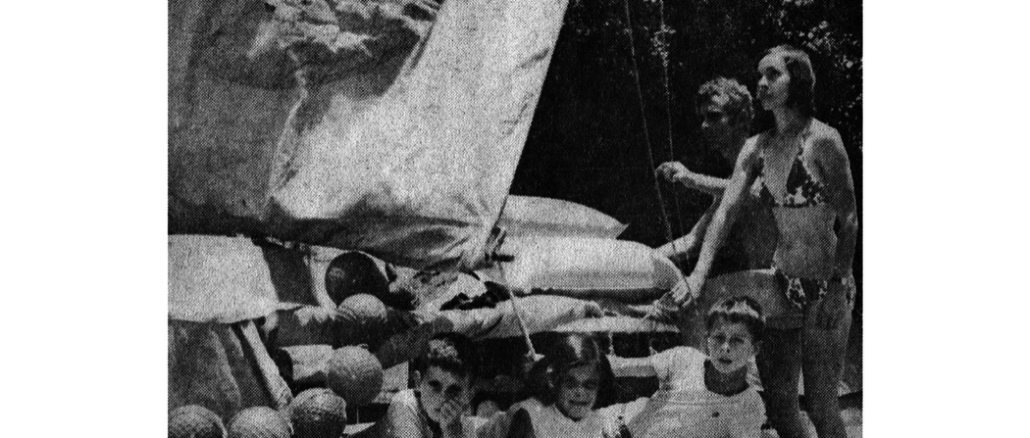
A young English family of five, desperate to visit a sick relative back home, attempts to sail from Australia in a rubber dinghy; instead they take a 6,500 kilometre, nine-month detour via Indonesia.
That is the absurd plot for Melbourne filmmaker Alessandro Frosali’s next project — but incredibly, it’s a true story ABC news reported.
“When I first heard the story, I heard it through the words of the youngest child, and he told me with such innocence and wonder and naivety,” Mr Frosali a director and writer, known for Dark Web (2017), Snare (2016) and Jungle Drums, (2017), told the ABC.
“I just thought it had the wonderful makings of an Australian feature film. It’s almost fantastical.”
The year was 1972, and the Horne family, who had emigrated to Melbourne as ‘ten-pound-Poms’ five years earlier, received the news their grandmother was gravely ill.
Desperate to see her but unable to afford the airfares, the father was struck by a bolt of inspiration when he passed a disposals store and spotted an inflatable rubber dinghy.
John Horne had served in the Royal Marines, and hatched the hare-brained scheme to sail it 16,000km to England with his wife and three children, aged eight, nine and 11 years old.
Incredibly, his wife Gisele was on board with the idea.
“They brought [the dingy] into the loungeroom and the kids remember furniture being pushed to the edges of the room … and both the mother and the father starting to prepare for the trip,” Mr Frosali said.
“They packed food for a month and a few additional safety features.
“They [fit] soccer balls to the side so if any of the children fell into the water they could hold on to be buoyant.”
Mr and Ms Horne have died, so no-one really knows why they decided Rockhampton, almost 2,000km north, was their best launch point.
In January 1973, the family set off in the ‘Ferry Ho’ from a boat ramp along the Fitzroy River, but only got as far as Yeppoon when a storm hit.
They were spotted by a local boat builder who offered them shelter and his expertise to make their vessel more seaworthy.
The Hornes stayed for two weeks, unaware there was a coast guard search underway, until they heard a news report.
“The father sent the kids to the police station [to report in] and the coast guard quickly came to them, saw they were rebuilding the boat and gave them a very stern warning: ‘You are not allowed to sail that boat again’,” Mr Frosali said.
“To most people that would have been the moment to say ‘We tried, the adventure was great’, but they didn’t.”
Out of funds but undeterred, the Hornes hitchhiked to Cairns with the notion of travelling further north via the Torres Strait.
Mr Horne literally sang for the family’s supper, performing at the infamous House on the Hill nightclub to raise enough funds for passage to Thursday Island, where he found work as a navigator on a Japanese pearl lugger bound for Darwin.
Three months later, they found cheap flights to East Timor but missed a connecting barge from Dili, which would have taken them to Jakarta.
Rather than wait 10 days, and determined to keep moving, they chose to travel overland to the Indonesian border, traversing remote areas where people had never been in contact with Europeans.
“This is where everything changes for the kids. It’s a new environment,” Mr Frosali said.
“You’ve got locals with betel nut-stained teeth, you’ve got cockfights in the street.
“The youngest child remembers being chased by a boar … they met tribes that had never seen a white family before. They were almost made out to be kings in the jungle.”
More than a week later they reached the border, but Mr Horne had fallen ill, contracting malaria and blackwater fever.
But he stubbornly refused treatment for several weeks until they reached Jakarta on a cargo boat that criss-crossed the Indonesian archipelago.
“It was only when an army man saw him and ordered him to hospital … the doctor said ‘If I was a day or two later, you’d be dead’,” Mr Frosali said.
Mr Horne survived but his family’s resolve was broken.
“The kids remember standing up to their parents and saying ‘Enough is enough’ … the eldest definitely had an issue with the parents [while] the youngest was quite naive to it,” Mr Frosali said.
They appealed to the English consulate in Jakarta to fly them to the motherland, a request granted under the condition they surrender their passports.
The Horne family arrived home just one day after Ms Horne’s mother passed away.
Mr Fosali is re-tracing the Horne family’s footsteps to research his film project, and hopes to hear from anyone who may have had contact with them during their epic, if not misguided, adventure.
SheSociety is a site for the women of Australia to share our stories, our experiences, shared learnings and opportunities to connect.

Leave a Reply